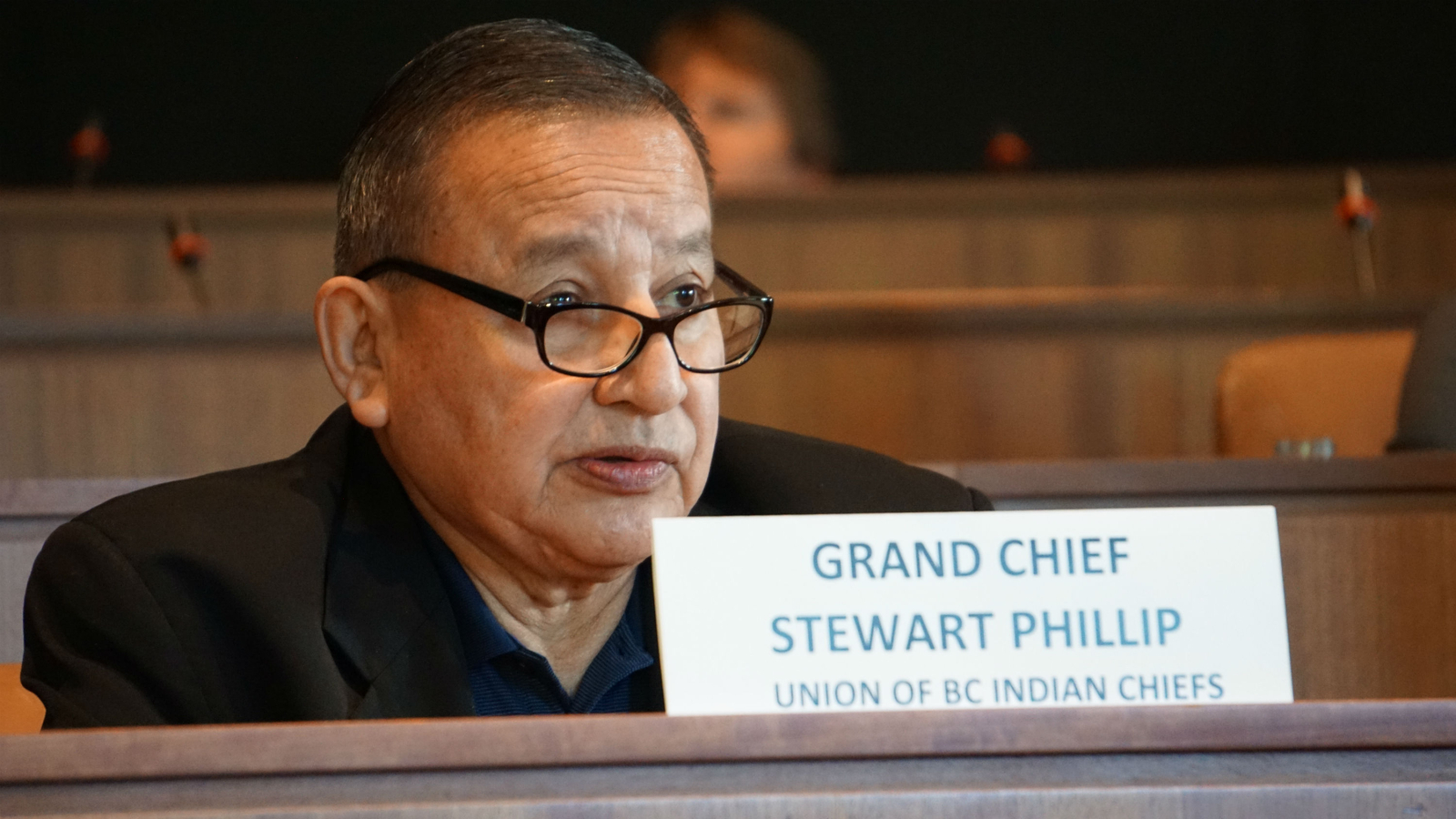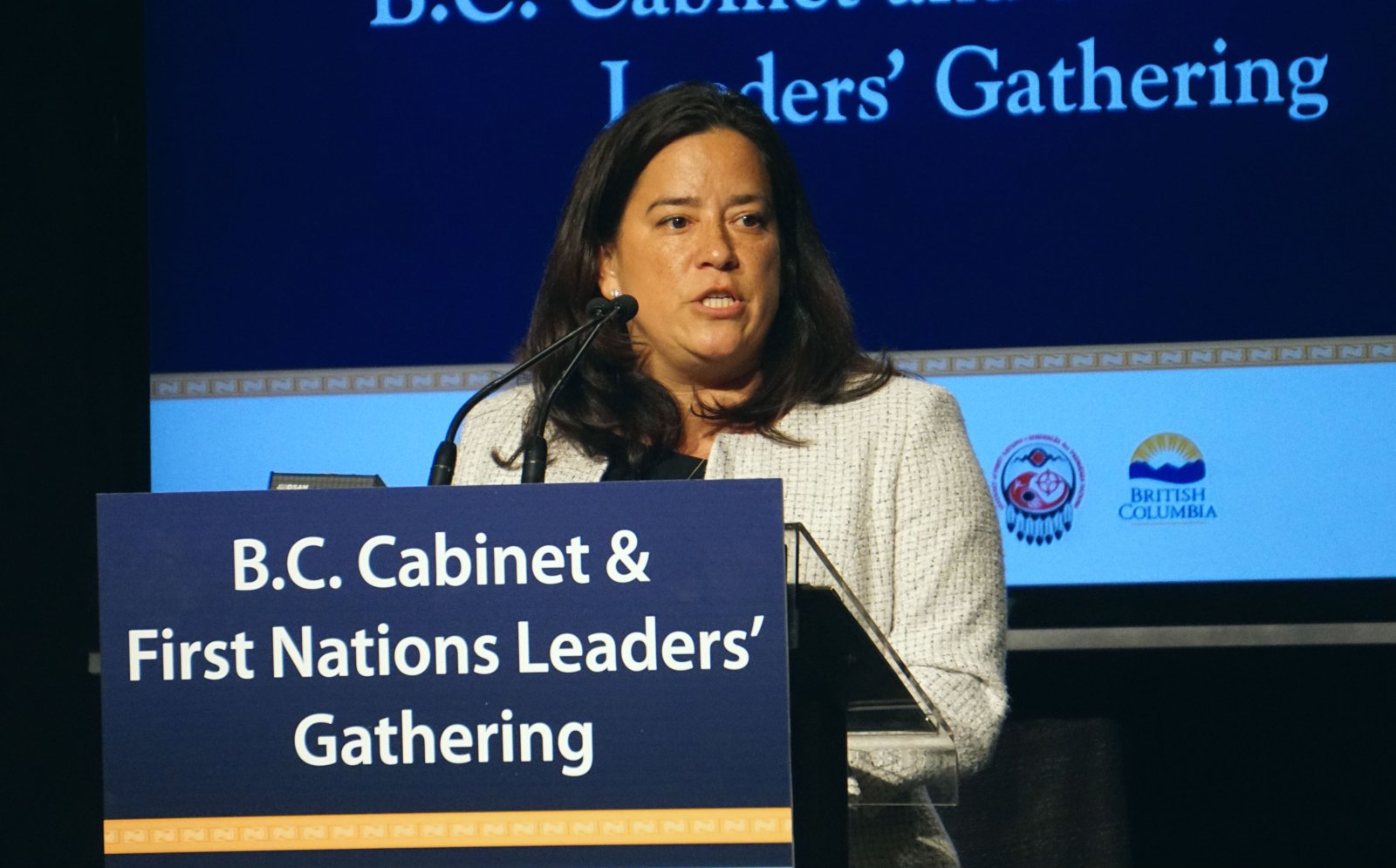Articles Menu
They applauded politely after British Columbia Premier Christy Clark's 30-minute speech at an Indigenous leaders' summit that opened on Wednesday. But Grand Chief Stewart Phillip says the entire affair was, predictably, disillusioning.
Phillip, president of the Union of BC Indian Chiefs, told National Observer that he wasn't impressed.
"Shocked" and "mortified," he said, was his reaction to her colourful descriptions of how she earned her traditional Indigenous name, Cha-chum-wha, from a local chief, how her grandfather learned to fish from the Nuu-chah-nulth First Nation, and how her great uncles were brought safely into the world by an Ahousaht midwife on Vancouver Island. The speech lacked substance, he said in an interview, and her attempt to connect with Indigenous delegates using anecdotes was "completely out of touch."
“Quite frankly, I was a bit shocked at how self-absorbed she was when she made her remarks," he said. "I felt in many ways that it was story time... she did not once reference the issue of outstanding aboriginal title and rights in the province of British Columbia."
Clark further mentioned an interaction with her son at a Catholic church — the primary perpetrator of Canada's horrific residential school system — a reference that drew blank stares from many First Nations participants in the room.
“You have to look at the government’s track record, and the Clark government’s track record on First Nations-Crown relations is absolutely abysmal," he explained.
"Not once did she mention the need for a reconciliation framework to move forward in the province of British Columbia, and she never made reference to the significance of the Tsilhqot’in decision and the need to genuinely commit to engage in a very robust dialogue."
 Grand Chief Stewart Phillip addresses aboriginal rights and title in British Columbia at a federal Trans Mountain pipeline expansion panel meeting in Vancouver, B.C. on Thurs. Aug. 18, 2016. Photo by Elizabeth McSheffrey.
Grand Chief Stewart Phillip addresses aboriginal rights and title in British Columbia at a federal Trans Mountain pipeline expansion panel meeting in Vancouver, B.C. on Thurs. Aug. 18, 2016. Photo by Elizabeth McSheffrey.
The Tsilhqot’in decision was a 2014 Supreme Court case ruling that granted a B.C. First Nation outside of a reserve official aboriginal rights and title, including the rights to choose how that aboriginal land is used. If respected at a provincial level, it would effectively block Clark's liquified natural gas goals where First Nations oppose them, though she tried during her speech to promote LNG as an economic opportunity for Indigenous people.
Her government recently signed LNG benefit agreements with six First Nations, she explained, and three clean energy agreements with two First Nations.
"We need to grow jobs across the province, but we also need to make sure First Nations people have the skills and education they need to take advantage of that growing economy," Premier Clark said. "You want to build a thriving future for your kids."
More than 1,000 First Nations individuals received training in the trades through provincial initiatives last year, she added, and another 1,000 are lined up to receive training next year. The province also recently announced a $250,000 investment in the Moose Hide Campaign, an Indigenous movement dedicated to ending violence against women and girls.
"That is just one form of reconciliation in action," Clark said of First Nations inclusion in economic growth. "I know we haven't changed every problem. We won't fix every problem, but we are beginning down that path together."
Many First Nations members in the room weren't convinced however, and Tsartlip Chief Don Tom said the premier is touting small successes of her government as voters start thinking about a provincial election in spring next year.
"She missed out on a lot of the issues and concerns that the chiefs have here in B.C.," he toldNational Observer. "It is an election year, and I know some of the work that we’re putting forward is being held up by the election coming up. Her speech was a lot of rhetoric about her government and finding small areas of success.”
 Justice Minister Jody Wilson-Raybould emphasizes the need to work together on the path of reconciliation during the 2016 B.C. Cabinet and First Nations Leaders' Gathering on Wed. Sept. 7 in Vancouver. Photo by Elizabeth McSheffrey.
Justice Minister Jody Wilson-Raybould emphasizes the need to work together on the path of reconciliation during the 2016 B.C. Cabinet and First Nations Leaders' Gathering on Wed. Sept. 7 in Vancouver. Photo by Elizabeth McSheffrey.
The chilly reception for Clark contrasted with the reaction to a keynote address earlier that morning for federal Justice Minister Jody Wilson-Raybould, MP for Vancouver-Granville and a former Regional Chief of the BC Assembly of First Nations. During her speech, Wilson-Raybould emphasized the need for Canada to collectively "roll up our sleeves" and get to work on reconciliation, the need for legislative reform around the outdated Indian Act, and the complexities of fully and truly implementing the UN Declaration on the Rights of Indigenous Peoples.
She spoke about the importance of deconstructing Canada's colonial mentality, "not fighting battles that have already been won, or reinventing the wheel where progress has been or is being made." Success is a fluid concept, she explained, that will be defined by markers set by Indigenous.
"There is no shortcut to getting at root causes of Indigenous poverty," she told delegates. "Experience and history has shown us that there is a direct correlation between economic prosperity and healthy communities following recognition and nation-building.
"Efforts to stimulate economic development and create jobs for Indigenous communities that fail to address relationship issues and shortcut the ground work that needs to be done to actually reconcile rarely have the results that were intended."
She drew on lessons learned by a recent visit to New Zealand, where the indigenous Māori are working on their own truth and reconciliation initiatives with the country's government. It was a "night and day" contrast from Clark's address, said Phillip, who called for a new provincial government in 2017.
“Our leaders are taking calls in their home communities as we spend our time here together talking about the need for Premier Clark and her government to stop dithering and get on with the business of implementing what the Tsilqotin decision represents," he said. "It’s very disconcerting and I’m hoping we have a change in government next spring and elect a government that does understand the gravity of these issues.”
The B.C. Cabinet and First Nations Leaders' Gathering is an annual conference organized by the B.C. Ministry of Aboriginal Relations and Reconciliation and First Nations Leadership Council, and provides Indigenous leaders with a chance to address provincial ministers directly on issues of concern. This is the first year federal representatives have attended the conference.